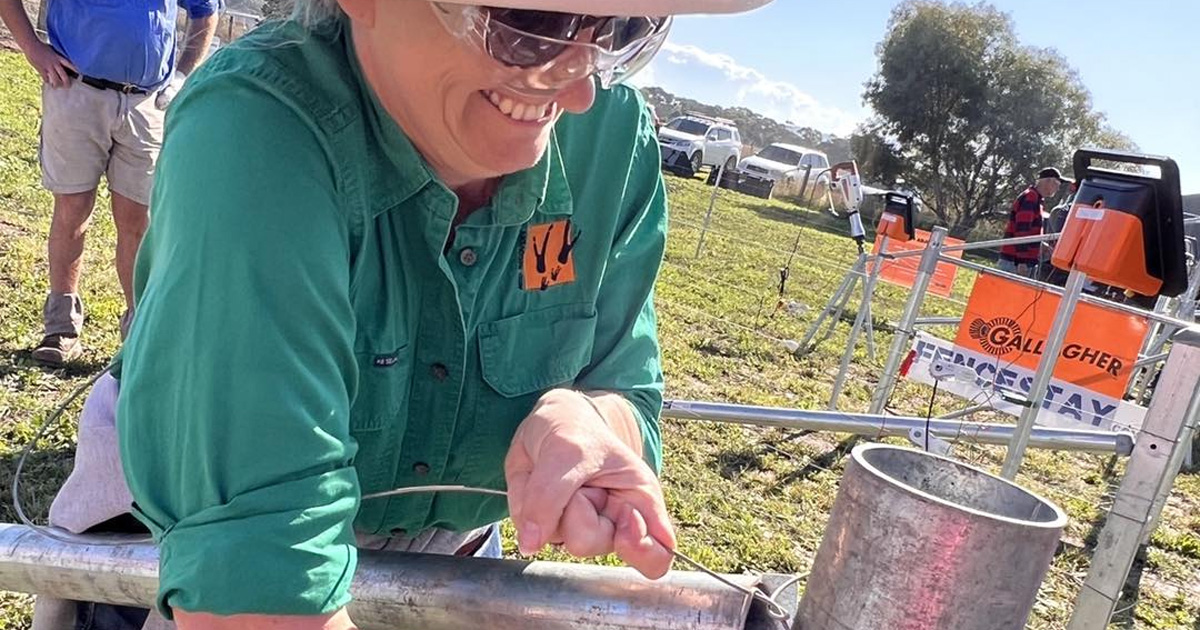
Why farm fencing skills are essential when you own a farm
Hobby farming or owning a lifestyle property has become increasingly popular in the Adelaide Hills and Fleurieu regions of South Australia. With more and more individuals embracing the joys of sustainable living, self-sufficiency, and the connection to the land.
However, while gardening and raising a menagerie of animals are enjoyable aspects of hobby farming, many often underestimate the importance of fencing skills.
Fencing is a fundamental element of successful farm management, and that’s why we’re hosting two ‘Farm Fencing 101‘ Workshops on the 24th and 25th of November 2023.
1. Protecting Livestock
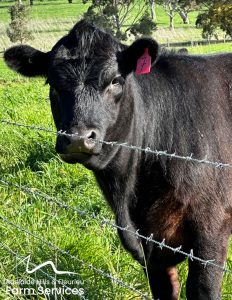
One of the primary reasons for developing your fencing skills is to safeguard your livestock. Whether you’re raising chickens, goats, sheep, or larger animals like horses or cattle, effective fencing is essential to prevent them from wandering off or falling victim to predators. In Australia, a diverse range of wildlife, from foxes to wild cats, pose significant threats to your animals. Properly constructed fencing can act as a reliable barrier to keep your livestock safe.
Having a farm fence that is fit for purpose is a big consideration if you’re new to farming and are contemplating what animals to run. In the Farm Fencing 101 Workshop, we’ll take you through what constitutes a farm fence and why some animals need a different type of fence. For example, Dorper Sheep (or any self-shedding sheep) will rub along fencelines to rid themselves of their wool. This can put a lot of pressure on your fences so you may consider a cyclone mesh with a smaller aperture. Similarly, many people with horses prefer a stiff-stay product with very small aperture to reduce the risk of their horses putting their hooves through it. Alpaca breeders don’t recommend that you use barbed wire as Alpaca’s can get their fleece caught in it. There is no standard farm fence or a one-size-fits-all solution. When its time to replace or repair your fences you may wish to take into consideration the purpose of the fence.
The other major risk you need to consider is if your livestock wanders onto roads. If your cattle or sheep cause a vehicle accident because you failed to contain them on your property, you may find yourself in hot water with the law.
Being able to do quick fixes and repairs to your fences whilst you wait (often weeks) for a fencing contractor to do a full repair will give you peace of mind.
2. Horses
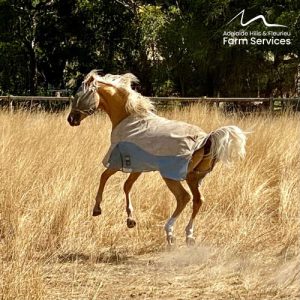
Horses deserve their own heading! Horse owners have often described their horses to us as ‘a little bit dumb’. If there is a small opportunity for horses to injure themselves, they’ll find it!
Here in the Adelaide Hills and Fleurieu, we are fortunate to have a substantial number of trees, rolling hills and many waterways. Whilst all this natural beauty is why we choose to live here, they can wreak havoc on our farm fences.
When tree limbs fall on fences or paddocks get waterlogged, the ability to undertake running repairs, re-strain wires, or replace rotten posts can mean you reduce the risk of possible injury to your horses.
3. Crop Protection
If you’re growing crops on your hobby farm or livestock property, having proper fencing skills is equally important. Fences can deter wildlife from raiding your garden, orchard, or vegetable plots. Kangaroos, rabbits, and other pests can decimate your hard-earned produce, making secure fencing essential to protect your agricultural endeavours. The last thing you want is for your cattle to nudge through poorly kept fences to eat your hay crop before its harvested. The grass is always greener on the other side, and this is where electric fencing can deter even the most determined livestock!

4. Water Management
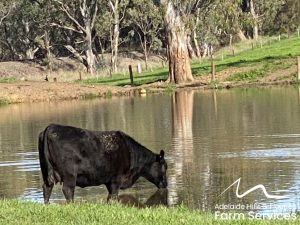
Water is a precious resource, and everyone, from lifestyle farmers to broad-acre farmers, must manage it efficiently. Fencing can be used to establish controlled access to water sources, ensuring that your livestock has a consistent and clean water supply. If you have a dam on your property that feeds troughs for stock water in other paddocks, it may be better to restrict access to the source dam. This will help preserve the dam’s banks and reduce the potential damage to the pump, pipes and other irrigation infrastructure.
5. Soil Conservation
Preventing soil erosion is another important aspect of farming. It doesn’t matter how many hectares you have; it doesn’t lessen your obligation to be a good steward of the land.
Fencing can be used to establish windbreaks, terraces, and buffer zones. This helps you achieve sustainable farming practices and protect the environment. On our property here at Currency Creek, the waterways are fenced off completely, which allows for native grasses and self-sown shrubs and eucalypts to grow without us having to install individual tree guards. We have all seen examples where tree guards are used to protect new growth, and these often get knocked by wildlife or fall over in high winds or rain; many find their way onto neighbouring properties or roadside verges. Fencing off the area may be a more effective long-term way to protect these plantings.

6. Infrastructure Maintenance
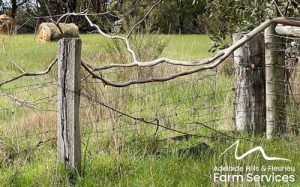
Having good fencing skills is essential for the maintenance of your farm infrastructure. Fences can be used to divide your farm into manageable paddocks, facilitating rotational grazing for your animals and ensuring your bulls stay out of the mob of cows when not in mating season! Your fences also allow for managing crop cycles and, importantly, can keep livestock out of the hay paddock or the hay shed! Effective fencing lets you make the most of your available space and protect your farm infrastructure.
We are often called upon to repair post and rail fences around irrigation infrastructure and tanks or to reinstall or restrain end assemblies in areas that are commonly used to climb over because they provide the quickest route to the shearing shed or house. Fences do deteriorate with time and use, and being able to maintain them yourself may alleviate the need to replace large sections in years to come.
7. Safety
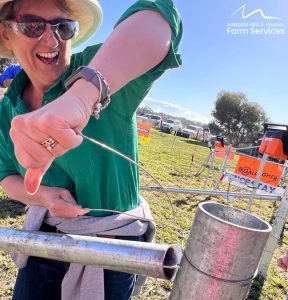
One of the most common and yet under-reported injuries to people on farms is cuts from old or loose wire.
Whether that be because someone rather unwisely decides to take a shortcut over a fence with barbed wire, a broken wire cuts your leg when you get out to open a gate, or as happened to me as a child, I trod on an old fencing nail that went straight through my rubber boot and into my foot!
Fences are hard to avoid on farms however, they are a necessary part of good farm management.
One of the most frequent questions asked to farmers when they arrive at a hospital to have a wound treated is, “When was your last Tetanus injection?”. According to the Queensland Ag website (you can also see what SA Health says about Tetanus here):
Tetanus is caused by a toxin produced by Clostridium tetani. The bacteria are commonly found in the environment, particularly in soil, dust and manure.
Fortunately, the occurrence of Tetanus in Australia is rare due to the availability of vaccine since 1925. However, if you get a tetanus-prone wound and have not had a tetanus booster dose in the previous five years, or you have never completed the 3-dose course of tetanus vaccination, seek medical attention immediately. Of course, there is also the risk of a general bacterial infection, cuts to the eye and damage to vehicles and stock to think about as well.
Keeping your fences in good condition and your paddocks clear from old fencing debris will improve the safety of your property for you, your visitors, contractors and your stock.
Conclusion
In conclusion, basic fencing skills are essential for all farmers, irrespective of the agricultural enterprise being undertaken. They are crucial for protecting your livestock, crops, and property boundaries and complying with local regulations, maintaining biosecurity, water management, and soil conservation. By mastering fencing techniques and ensuring your farm is properly fenced, you can create a safe, productive, and sustainable environment for your farming activities. So, if you’re new to farm life or you’re a seasoned hobby farmer, invest the time and effort to hone your fencing skills, and your farm will thrive.
If you’re keen to learn how to install a farm fence or you want to improve your farm fencing skills to a point where you have the confidence to undertake running repairs, then book in for our ‘Farm Fencing 101‘ Workshop.
